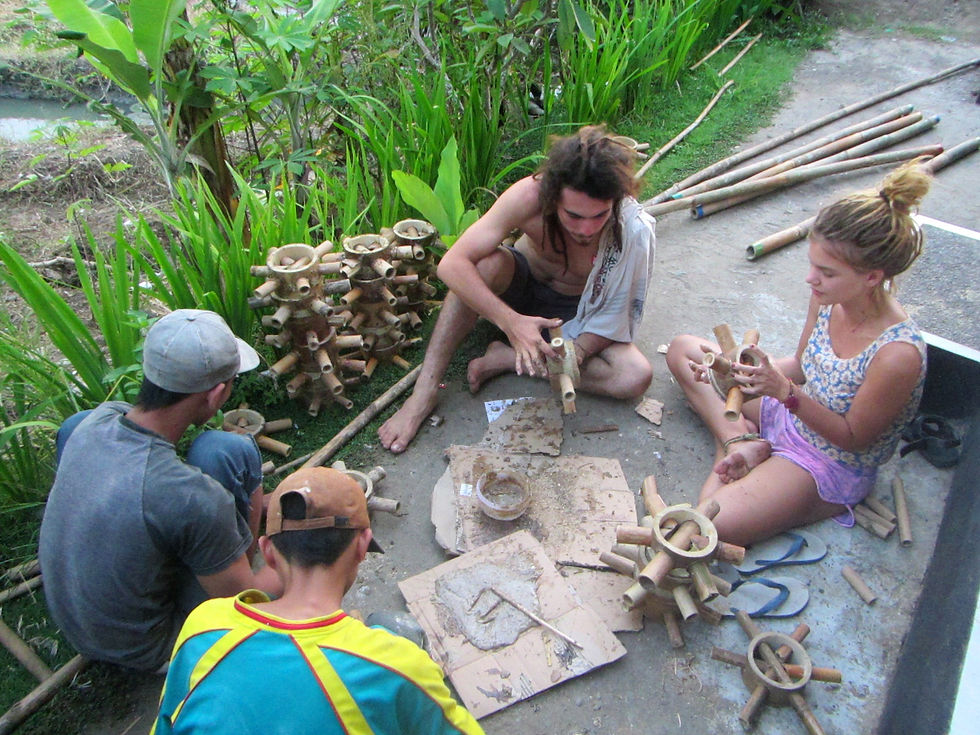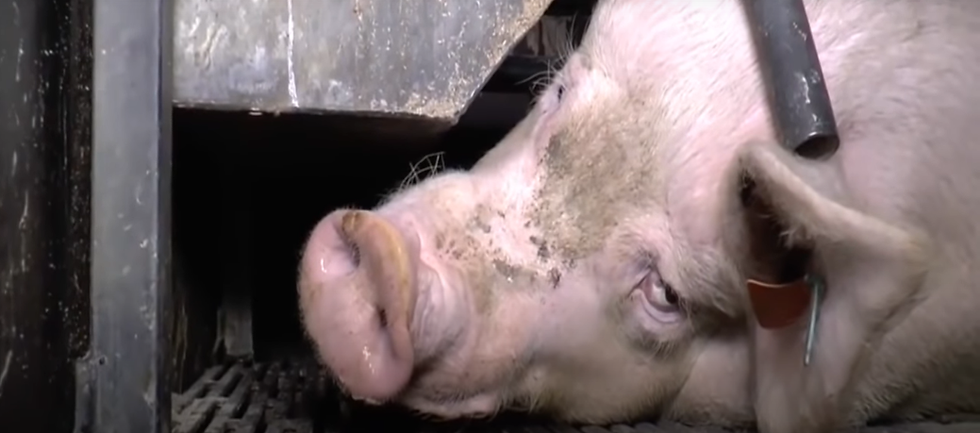The Earth as a Living Being: Protecting our Planet with Ecocide Law
- Tess Joyce
- Dec 18, 2020
- 5 min read

‘The Days of Creation’ by Edward Burne-Jones, 1870-1876
Nature is alive
I recently watched a powerful speech by the Ecuadorian environmental and indigenous rights defender, Nina Gualinga, during a panel discussion with environmentalists about ecocide law and its hopeful implementation into the Rome Statute of the International Criminal Court as a crime alongside war crimes, genocide and crimes against humanity. It is hoped that such an implementation would provide as a deterrent for those in positions of responsibility in order to avoid the image that a prosecution of this kind would bring.
Nina shared the following words during the conference:
“Nature is alive, everything is alive: the water, trees, stones, it’s all interconnected. When the frogs sing at night they tell us what the weather will be like the following day…What we are doing is a crime…it is a crime against future generations, it is a crime against nature, it is a crime against humanity.”
Non-duality & Interconnectedness
Some further ideas about how ecocide as a law could work were discussed and the group pondered on some questions regarding whether we should put our focus on anthropocentric or ecocentric needs – would we prosecute in regards to harm to the environment per se or in regards to its human impacts? Does nature have value outside of human-related needs? I would like to bring some non-duality philosophy into the debate here. Many scientists discussing at conferences such as Science and Non-Duality (SAND,) indigenous communities and spiritual teachers, agree on the interconnectedness of consciousness – is it possible to draw lines between what is human and what is the environment? Especially when everything (including man-made items) are made from the same atomic building blocks of the universe?

A Permablitz (permaculture gardening) in Bali
The following is a quote from the website of the nonprofit organisation, Science and Nonduality or SAND:
"The cult of separation has brought dominance and submission, marginalization and oppression, violence toward the other along with the mechanistic, materialistic view of life that has shaped our society.
At SAND we envision a humanity firmly rooted in the truth of our interconnectedness. We see Earth as a living being and we hold life, in all its shapes and forms, as intelligent, sacred and complete.”

"If you want to make an apple pie from scratch, you must first create the universe." Carl Sagan
Research on Consciousness
Research has already been conducted using MRI scanning to examine how the brain functions for meditating monks and nuns. These results have shown that during exercises such as compassion meditations, the brains of the monks showed enhanced activity in the left prefrontal cortex, thought to be the seat of positive emotions, compared to the right prefrontal cortex which houses negative emotions. High-frequency brain activity of gamma waves were also attained by monks which were observed to be lower for novice monks suggesting that training can bring the mind to higher states of consciousness. Having published research about MRI scams and meditating Tibetan monks and nuns psychologist and professor, Zoran Josipovic, claimed that our brains are hardwired for unity, beyond concepts of duality or separation – through meditation we can experience a state of oneness or harmony with our environment. Josipovic is also the founding director of the Nonduality Institute, an independent centre for the scientific research of nondual awareness.
Deep Ecology
There is also the field of deep ecology to contemplate – this philosophy teaches about the inherent value of every living being outside of its utility to human needs and also reconsiders human society in relationship with these themes. This standpoint is not anthropocentric and takes a holistic view of the world in which humans occupy roles as part of a much larger system. One core principle of deep ecology is the belief that the living environment should be respected and given basic legal and moral rights to enable it to flourish regardless of its utility for humans. Deep ecology holds various concepts such as no longer seeing the natural world as a resource but seeing the richness of the diversity of life-forms as having intrinsic value. The phrase ‘deep ecology’ first appeared in a paper in 1973 by Norwegian philosopher Arne Næss. However the conservationist and marine biologist, Rachel Carson, has been credited as being foundational to the movement with her book, ‘Silent Spring’ which was published in 1962.

“The balance of nature is not a status quo; it is fluid, ever shifting, in a constant state of adjustment. Man, too, is part of this balance.” From the ‘Silent Spring’ by Rachel Carson.

It is thought that the body is made up of 60% water and 71% of the planet’s surface is covered with water. We are not so different to the rivers, yet how often do we reflect upon this in society?
Satellite Monitoring
For a law on ecocide to work, it is thought that satellite monitoring will be essential in order to find out exactly who is accountable. At the moment in the Amazon, it is thought that up to 90% of the deforestation is illegal – the cleared land is often converted into pasture for cattle or crops are grown for livestock, such as soy.
Polly Higgins
In the ecocide law conference, the work of Polly Higgins was also brought to attention. Born in Glasgow, the barrister Polly Higgins gave up her job and sold her house in England in order to fund her campaign to develop ecocide law and spent much of her time drafting up proposals about what these laws could look like – she presented this work at many international councils and cofounded the Stop Ecocide campaign in 2017 with Jojo Mehta.

Image from www.stopecocide.earth
She once said the following:
“There are millions who care so much and feel so powerless about the future, and I would love to see them begin to understand the power of this one, simple law to protect the Earth - to realise it’s possible, even straightforward…I wish I could live to see a million Earth protectors standing for it - because I believe they will.”
Petition
A petition to parliament has been started by the Stop Ecocide campaign regarding the implementation of ecocide law into the Rome Statute of the International Criminal Court and the deadline is the 27th January 2021. Please sign here:
“We are, in fact, productions of this earth. We are, as it were, its organs. Your eyes are the eyes of this earth; our knowledge is the earth’s knowledge. And the earth, as we now know, is a production of space.” ‘The Inner Reaches of Outer Space’ by Joseph Campbell.
Mankind is part of Nature
“But man is a part of nature, and his war against nature is inevitably a war against himself.” From the ‘Silent Spring’ by Rachel Carson.



From ‘Land of Hope and Glory.’
What happens when we come back to our pure awareness, beyond our human-centred emotions or focus? When we meditate we are invited back to that place of deep intelligence, discernment and awareness where life for all beings, unfolds without the need for any commentary. Both humans and animals can experience trauma, we can put up walls and become disconnected from the heart. Part of our journey is to pull down these walls of separation and to begin to trust ourselves again and each other.

James French, founder of the Trust Technique.
"There was something formless and perfect before the universe was born. It is serene. Empty. Solitary. Unchanging. Infinite. Eternally present. It is the mother of the universe. For lack of a better name, I call it the Tao. It flows through all things, inside and outside, and returns to the origin of all things. The Tao is great. The universe is great. Earth is great. Man is great. These are the four great powers."
From ‘Tao Te Ching’ by Lao Tzu.
Thank you for reading and please see my film on this topic if you would like to hear these words narrated:





Comments